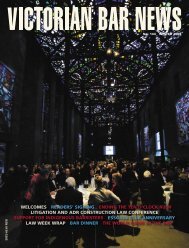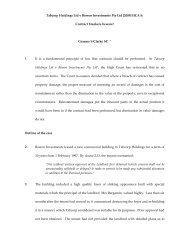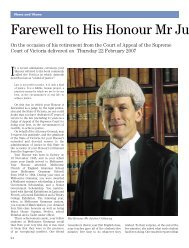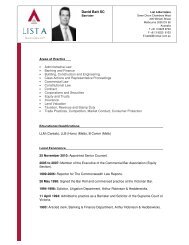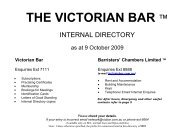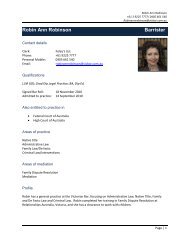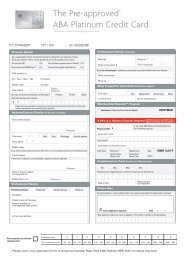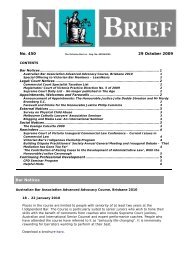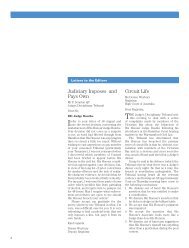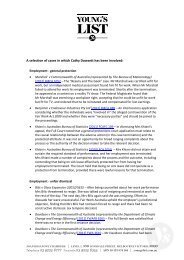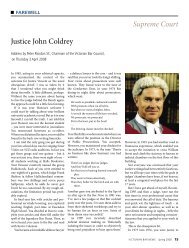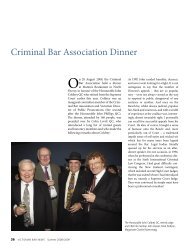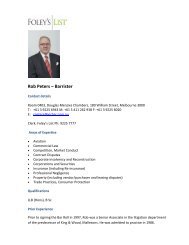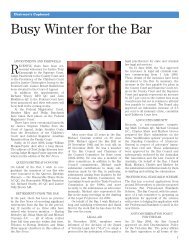Justice William Charles Crockett AO - Victorian Bar
Justice William Charles Crockett AO - Victorian Bar
Justice William Charles Crockett AO - Victorian Bar
- No tags were found...
You also want an ePaper? Increase the reach of your titles
YUMPU automatically turns print PDFs into web optimized ePapers that Google loves.
AN UNRESOLVED QUESTIONA tantalising question — which willrequire resolution at some future time— is whether the Weiss approach isapplicable to appeals against conviction inCommonwealth cases. On one view, Weissdictates that once error is found, an appellantis, in effect, tried by the appellatecourt. It is for the appellate court to determinewhether guilt is established beyondreasonable doubt. Some would argue thatto apply Weiss in Commonwealth cases isto infringe s.80 of the Constitution. 49A PARTHEON SHOT?As we have seen, the High Court’sextraordinary decision in Weiss arose outof Callaway JA’s decision in the Court ofAppeal.In one of his last criminal cases beforeretirement, 50 Callaway JA implicitly suggestedthat Weiss dictated that the Courtwas required in that case to send it backfor a retrial rather than dismiss the appealby invoking the proviso (which seems tobe the opposite of what the High Court ingeneral intended).Rajakaruna (No 2) 51 involved convictionsfor rape of two prostitutes and associatedoffences. One of the complainantsmade a complaint of rape, and was seenby the person to whom the complaint wasmade to bear obvious injuries. Betweenthe time of the alleged rape and the complaint,however, the complainant spoke toanother person who observed no injuries.Without directly cross-examining thecomplainant on the matter, counsel forthe defence floated the argument in hisfinal address that this evidence indicatedthat the injuries might not have beeninflicted at the time of the rape, but atsome other later time.Counsel was criticised to the jury bythe trial judge for putting this argumentwithout first cross-examining on the topic.The Court of Appeal found this criticismto be wrong. It was held that the provisocould not be applied. Callaway JA’sreasons for not applying the proviso areinstructive. He said: 52[5] Before the decision of the High Courtin Weiss v The Queen this Court mighthave held that counsel’s argument wasso speculative that the judge’s errormade no difference despite the importanceof the injuries to the prosecutioncase. I do not stay to consider whetherthat would have been our conclusion.Before we can apply the proviso, weare now required, on the whole of therecord, to say that we ourselves aresatisfied beyond reasonable doubtthat the applicant was guilty. Therebeing no question of consciousness ofguilt, if we disbelieve his assertions inthe record of interview, the case is nobetter than if he had said nothing inhis own defence. The prosecution casethen depends on the credibility of thecomplainants. To be satisfied beyondreasonable doubt that the applicantwas guilty, one would need to seethem give their evidence and becross-examined. [Footnotes omitted;emphasis added.]CONCLUSIONThe words of the proviso cannot carrywith them the burden found by the HighCourt in Weiss. As a matter of languagethe proviso permits a court to ignore amiscarriage of justice that is not substantial.Nothing in the clear words of the proviso— regardless of its historical raisond’etre — requires an appellate court toapproach its application in the same waythat a court must approach a complaintthat a jury verdict is unsafe and unsatisfactory.To approach its interpretation inthat way simply is to read words that arenot there.At one level, Weiss has placed anunwarranted extra burden upon intermediateappellate courts resting on dubiousfoundations. The extent of the proviso’spractical application is in greater doubtnow than it was before Weiss was delivered.At another level, judges of intermediateappellate courts are left with theunpalatable alternatives of either refusingto apply it (which has the potentialto undermine the authority of the HighCourt), or applying it in circumstanceswhere conscientiously the judges believeit to be in error.Weiss is wrong. It should be reconsidered.Notes1. Criminal Appeal Act 1912 (NSW),s.6(1); Criminal Law Consolidation Act1935 (SA), s.353(1); Criminal Code (Q),s 688E(1) and (1A); Criminal AppealsAct 2004 (WA), s.14(2); Criminal CodeAct 1924 (Tas), s.402(1) and (2); CriminalCode Act (NT), s.411(1) and (2). By contrast,the proviso is not found in the FederalCourt of Australia Act 1976 (Cth); asto the effect of which, see Conway v TheQueen (2002) 209 CLR 203 at 218–219[35]–[36] per Gaudron ACJ, McHugh,Hayne and Callinan JJ, 230–231 [76]–[77]per Kirby J.2. Crimes Act 1961 (NZ), s.385.3. Criminal Code (Can.), s.686(1).4. It is interesting to note that, by comparison,the Canadian equivalent limits the applicationof the proviso to “a wrong decision ona question of law” i.e. the second groundonly. In a curious oversight, the Canadianlegislation, and the cases based upon it, donot appear to have been resorted to as anaid to interpretation by the High Court inWeiss.So far as is relevant, s.686 of the CriminalCode provides:(1) On the hearing of an appeal against aconviction …, the court of appeal(a) may allow the appeal where it isof the opinion that(i) the verdict should be setaside on the ground thatit is unreasonable or cannotbe supported by theevidence,(ii) the judgment of the trialcourt should be set asideon the ground of a wrongdecision on a question oflaw, or(iii) on any ground there was amiscarriage of justice;(b) may dismiss the appeal where(i) the court is of the opinionthat the appellant,although he was not properlyconvicted on a countor part of the indictment,was properly convicted onanother count or part ofthe indictment,(ii) the appeal is not decidedin favour of the appellanton any ground mentionedin paragraph (a),(iii) notwithstanding that thecourt is of the opinionthat on any groundmentioned in subparagraph(a)(ii) the appealmight be decided infavour of the appellant,it is of the opinion thatno substantial wrong ormiscarriage of justicehas occurred, or(iv) notwithstanding any proceduralirregularity at trial,the trial court had jurisdictionover the class ofoffence of which the appellantwas convicted and thecourt of appeal is of theopinion that the appellantsuffered no prejudicethereby … [Emphasisadded.]39



